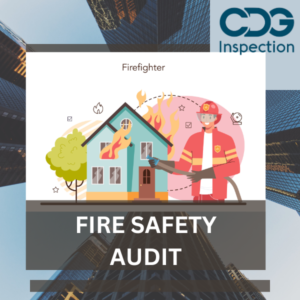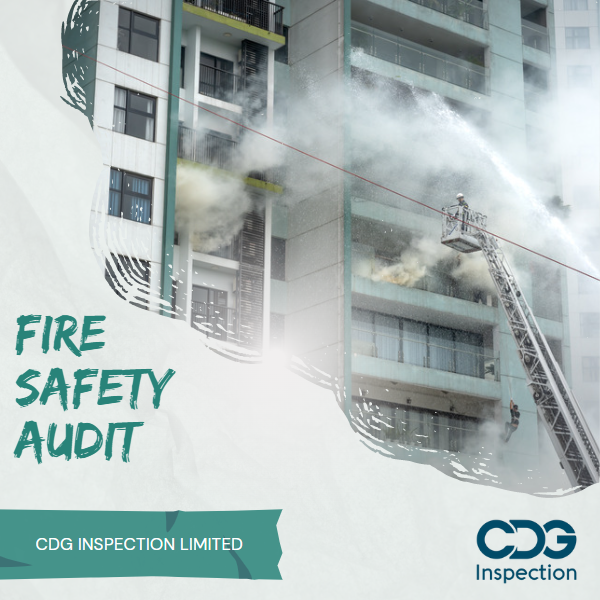Introduction
Fire safety is an essential aspect of maintaining a secure environment in any city. Palwal, a thriving city known for its industrial and residential sectors, requires diligent attention to fire safety measures. Conducting regular fire safety audits is crucial to identify potential hazards, enhance preparedness, and ensure the safety of lives and assets.

Importance of Fire Safety Audits
Fire safety audits play a pivotal role in mitigating risks and preventing fire incidents. They are comprehensive evaluations carried out by experts to assess the fire safety protocols and measures implemented in a particular location. Let’s explore the key reasons why fire safety audits are crucial in Palwal:
Identifying Potential Hazards
A fire safety audit helps identify potential fire hazards in various settings, including residential buildings, commercial establishments, and industrial sites. By examining factors such as faulty electrical systems, improper storage of flammable materials, and inadequate fire suppression measures, audits bring to light the vulnerabilities that can lead to disastrous incidents.
Evaluating Safety Measures
Through a fire safety audit, the effectiveness of existing fire prevention and protection measures is evaluated. This includes assessing the functionality of fire detection systems, the availability and condition of fire extinguishers, and the efficiency of emergency evacuation plans. By identifying gaps and areas of improvement, audits ensure that safety measures are up to date-and capable of addressing potential fire emergencies.
Ensuring Compliance with Regulations
Fire safety audits ensure that all establishments in Palwal comply with local fire safety regulations and codes. By verifying adherence to standard safety practices, audits contribute to the city’s overall safety. Compliance not only reduces the risk of fire incidents but also provides a legal framework to hold accountable those responsible for maintaining fire safety standards.
Enhancing Preparedness
Regular fire safety audits help improve the preparedness of Palwal in dealing with fire emergencies. By identifying shortcomings in fire safety measures, audits prompt corrective actions, such as training occupants on fire evacuation procedures, conducting drills and establishing clear communication channels. Enhanced preparedness equips individuals with the knowledge and skills necessary to respond effectively in the event of a fire.
Critical Elements of a Fire Safety Audit
To ensure a comprehensive evaluation, fire safety audits in Palwal encompass several key elements. Let’s explore these crucial aspects:
Fire Detection and Alarm Systems
Audits focus on examining the functionality and reliability of fire detection and alarm systems. This includes testing smoke detectors, fire alarms, and emergency notification systems to ensure they are in proper working condition. Regular maintenance and prompt repairs are recommended to guarantee the effectiveness of these systems.
Fire Suppression Systems
The audit evaluates the availability and effectiveness of fire suppression systems, such as sprinklers and extinguishers. It assesses whether these systems are correctly installed, regularly maintained, and capable of effectively controlling or extinguishing fires. Any deficiencies or malfunctions should be promptly addressed to minimize potential risks.
Emergency Evacuation Plans
An essential component of fire safety audits is assessing emergency evacuation plans. This involves reviewing the accessibility and condition of emergency exits, ensuring clear evacuation routes, and verifying that evacuation procedures are well-documented and communicated to all occupants. Regular drills and training sessions are recommended to ensure individuals are familiar with the evacuation protocols.
Training and Education
Fire safety audits emphasize the importance of training and education for the occupants of Palwal. Assessing the level of awareness and knowledge about fire safety practices among residents and employees is vital. Recommendations for conducting regular training sessions, providing educational materials, and raising awareness about fire safety can significantly contribute to a safer environment.
Conclusion
Conducting regular fire safety audits in Palwal is crucial for maintaining a secure environment and preventing fire incidents. By identifying potential hazards, evaluating safety measures, ensuring compliance, and enhancing preparedness, these audits play a pivotal role in protecting lives and assets. The city and its residents need to prioritize fire safety and invest in proactive measures to create a resilient community that can effectively respond to fire emergencies. Let us work together to make Palwal a safer place for everyone.

